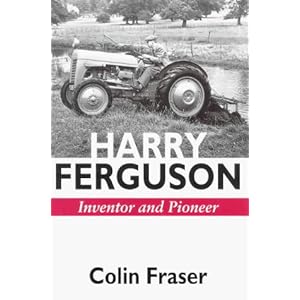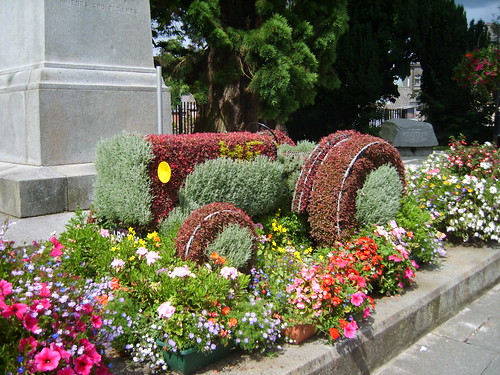
So when I got a Waterstones gift card, I had a look in their Belfast shop, and discovered this bigoraphy of Harry Ferguson by Colin Fraser, and decided to buy it. What a great read it was! It's certainly in my top three books of the year, and one I enjoyed immensely, even for knowing so little in advance. First published in 1972, the book has been reprinted six times, which in itself shows its value, the most recent (according to my copy) being 2008. So what of the contents of the book?
Right at the very start of the book, the introduction establishes the greatness of the man who was Harry Ferguson. It is estimated that 85% of all tractors in the world incorporate his inventions, even if unreferenced. That's quite an impact, yet with his genius, and the possibility of hero-worship, Fraser is also realistic and carefully critical of the man: 'he was a man of great complexity and with a character of almost unbelievable contradictions.'

The book then traces the Ferguson story, from being born and growing up at Growell, near Dromore, County Down, Northern Ireland into a strict home (more on which shortly), becoming involved in the early attempts at flight in Ireland, setting up his car business in May Street, Belfast, helping out in the UVF gun running of 1913, to his lifetime work of inventing and improving agricultural machinery and tractors.
His work with tractors came about because of World War 1, and the need for Britain and Ireland to produce more of its own food - yet with a shortage of manpower and horsepower due to the war effort. Early tractors were unwieldy, heavy, and were seen as nothing but a direct substitute for the horses they were replacing. Ploughs continued to be pulled by chains, which was ultimately dangerous and could lead in extreme cases to death as the tractor reared up when a stone was struck by the plough. As Fraser records it, '"There must be a better way of doing the job. We'll design a plough." These words marked the beginning of what turned out to be almost twenty years of experiment.'
The book charts the massive leaps in design and invention employed by Ferguson and his team, explaining things in such a way that even this townie was able to understand what was being done. The insight into his character and commitment to his work is remarkable, with an almost obsessive drive to produce the perfect tractor and plough combination, leading to his gentleman's agreement with Henry Ford to produce a new Ford tractor with the Ferguson linkage system. Eventually the agreement broke down (after the death of Henry Ford), and it seems that the Ford company dumped Ferguson and produced its own lightly modified version of his work, which resulted in a lengthy anti-trust case and many negotiations.

Later, Ferguson entered into partnership with Massey-Harris, but soon wanted to sell his shares (to begin, in his seventies, work on an all-wheel-drive car!) which led to the famous million-dollar-coin toss. Basically, there was a quibble over the value of the Ferguson company, either $16m or $17, and Ferguson resolved to settle the dispute by tossing a coin. Ferguson lost out on his extra $1m because of the toss!
There are many more stories that could be told, plenty of fascinating details and interesting events, partly due to Ferguson's character and manner of business dealings, and partly due to the range of characters who worked around him. However it is in the realm of faith that I want to focus, in this fascinating life.
I mentioned earlier that Harry grew up in a strict home. Here's how his father is described: 'an austere, bearded, wrath-of-God figure, exercised the sternest discipline on his family. He was a Plymouth Brother and an extreme bigot.' In the home, the only reading material allowed was the Bible, but Harry would smuggle in books and read them under the covers. It seems that, rather than bringing up his children to love the Lord, Mr Ferguson senior drove Harry away.
'His rebelliousness over religion was now crystallising itself into agnosticism. As Harry said himself in a letter:
'I think I could sum up my final conclusions by saying that I do not believe taht anybody will be rewarded or punished in whatever the next world may be, for anything they say they believe.
'People cannot help their beliefs. We are forced to what we believe by evidence. If we are honest we say what we believe. I believed that all these millions could have escaped Hell by saying they believed in the same beliefs as I did. No, what I now believe is that if we are rewarded or punished in another world, it will not be for what we believe but for how we have acted.' (pp. 13-14)

This was his driving philosophy, yet there's a moment later on in the book where it seems that something he heard as a child had stuck with him, albeit out of context and strangely applied. Ferguson believed that his agricultural machinery was the much-needed breakthrough for world peace. It was his contention that wars happened because of need, driven by inflation and food supply. Given that his tractors and ploughs were simple to use and fairly cheap, he believed that if they were bought and used all over the world, every person could be fed, every small farmer could be sustained, and wars would cease. At a prestigious post-war conference, Ferguson had a chance to sell his idea to agricultural and food ministers from many nations, in which he made this audacious claim: 'Our plan ought to be to fight Communism and beat it, not by the usual implements of war, but by beating our swords into ploughshares in the literal sense. We must grow food for the multitudes to eat... that is the only final solution.' (p. 218). Let's be clear, he's not the Messiah, he's an agricultural inventor, who perhaps sometimes got ideas above even his lofty station.

All in all, Harry Ferguson appears to have been an interesting, indeed fascinating man to know and work with. At the same time, though, it seems to have been hard to get to know him, and stay on the right side of him. Captivated by his vision of farm machinery and eradicating poverty through his tractor, he pursued his ideas in an almost obsessive way, driving away friends and colleagues, such that his only constant seems to have been his wife, Maureen Watson of Dromore.
The book is highly recommended, for lots of reasons, some of which may have been shown in this review. It's an amazing portrait of an amazing man; it provides a good social history of the two world wars; it's recent history and charts the pursuit of new ways to do old jobs. There are also some good photos of his inventions, which help to set the scene.
The Harry Ferguson Memorial Garden is now open at Growell, opposite the old Ferguson homestead, which contains information about Harry Ferguson, as well as the statue photographed above. The wee grey fergie flower display was in Hillsborough several years ago.
No comments:
Post a Comment